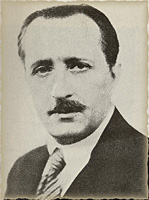Paul Pelliot
| Paul Pelliot | |||||||||||
|---|---|---|---|---|---|---|---|---|---|---|---|

Paul Pelliot
|
|||||||||||
| Born |
28 May 1878 Paris, France |
||||||||||
| Died | 26 October 1945 (aged 67) Paris, France |
||||||||||
| Nationality | French | ||||||||||
| Fields | Chinese history | ||||||||||
| Institutions |
Collège de France École Française d'Extrême-Orient |
||||||||||
| Academic advisors |
Édouard Chavannes Sylvain Lévi |
||||||||||
| Notable students | Paul Demiéville | ||||||||||
| Known for | Dunhuang manuscripts discovery | ||||||||||
| Chinese name | |||||||||||
| Chinese | 伯希和 | ||||||||||
|
|||||||||||
| Transcriptions | |
|---|---|
| Standard Mandarin | |
| Hanyu Pinyin | Bó Xīhé |
| Gwoyeu Romatzyh | Bor Shiher |
| Wade–Giles | Po2 Hsi1-he2 |
Paul Eugène Pelliot (28 May 1878 – 26 October 1945) was a French sinologist and Orientalist best known for his explorations of Central Asia and his discovery of many important Chinese texts among the Dunhuang manuscripts.
Paul Pelliot was born on 28 May 1878 in Paris, France, and initially intended to pursue a career as a foreign diplomat. Accordingly, he studied English as a secondary school student at La Sorbonne, then studied Mandarin Chinese at the École des Langues Orientales Vivantes (School of Living Oriental Languages). Pelliot was a gifted student, and completed the school's three-year Mandarin course in only two years. His rapid progress and accomplishments attracted the attention of Édouard Chavannes, the chair of Chinese at the Collège de France and a renowned sinologist, who befriended Pelliot and began mentoring him. Chavannes also introduced Pelliot to the Collège's Sanskrit chair, Sylvain Lévi. Pelliot began studying under the two men, who encouraged him to pursue a scholarly career instead of a diplomatic one.
In early 1900 Pelliot moved to Hanoi to take up a position as a research scholar at the École Française d'Extrême-Orient (EFEO, "French School of the Far East"). In February of that year, Pelliot was sent to Peking (modern Beijing) to locate and buy Chinese books for the school's library. Between July and August, Pelliot was caught up in the siege of the foreign legations during the Boxer Rebellion. At one point, during a ceasefire, Pelliot made a daring one-man foray to the rebels' headquarters, where he used his boldness and fluency in Mandarin to impress the besiegers into giving him fresh fruit for those inside the legation. For his conduct during the siege, as well as for capturing an enemy flag during the fighting, he was awarded the Légion d'Honneur upon his return to Hanoi. In 1901, when only 23 years old, Pelliot was made a professor of Chinese at the EFEO.
...
Wikipedia
